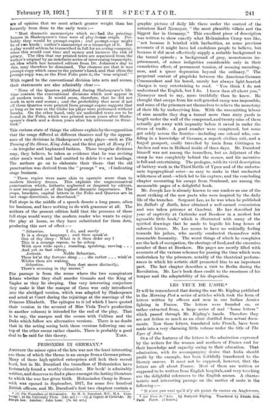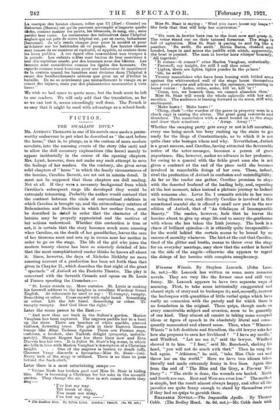LES YEUX DE L'ASIE.* IT will be remembered that during
the war Mr. Kipling published in the Morning Post a series of articles which took the form of letters written by officers and men in our Indian Armies fighting in France. The letters were founded on, or rather extracted from, a large series of real " home letters " which passed through Mr. Kipling's hands. Therefore they are not fiction so much as an elixir distilled from actual docu- ments. Now these letters, translated into French, have been made into a very charming little volume under the title of The Eyes of Asia.
Ore of the features of the letters is the admiration expressed by the writers for the women and mothers of France and for their knowledge and capacity owing to their education. That admiration, with its accompanying desire that India should profit by the example, has been faithfully transferred to the literary canvas. It must not be supposed, however, that the letters are all about France. Most of them are written or supposed to be written from English hospitals, and very touching are the delightful references to the English nurses. A charac- teristic and interesting passage on the matter of caste is the following :—
" II n'est pas vrai qu'il n'y ait point de castes en Angleterre.
• Let Yeux de l'Asie. By Itudyard Kipling. Translated by Firmin AO& Paris Payot. [3 francs.] La marque des hautes classes, telles que Ul {Ear/ : Comte] ou Baharnm. [Baron] est qu'ils peuvent accomplir n'importe quelle ache; comma manier les morts, les blessures, le sang, etc., sans perdre leur caste. La maharanee des infirmierea dans l'h8pital anglais qui- est pros de notre hapital eat, par sa caste, baharanee [barennel. Je m'y rends chaque jour pour is societe et pour ra'Oclairer sur les habitudes de ce peuple. Les hautes classes sont tenues de ne montrer ni curiosite, m appetit, ni crainte dans les lieux publics. A cet egard elles resssmblent .aux. troupes a la parade. Lea enfants males sent beaus -de leur neuvieme lour dix-septisme armee, par des hommes avec _der bfkons. Lea femmes sent considerees comma les egales des hommes. On regarde comme aussi honteux.pour une baharanee de manifestos de la crainte quand les lumieres sent eteintes dans l'h8pital cause des bombardements aeriens que pour un u/ d'eviter la bataille. Its ne se noircissent pas mutuellement le visage en ae criant des .injures, mais par des plaisanteries raurmurees I voix basse."
We wish we had space to quote more, but the book must be left to our readers. We will only add that the translation, as far as we can test it, seems exceedingly well done. The French is so easy that it might be used with advantage as a school-book.



































 Previous page
Previous page